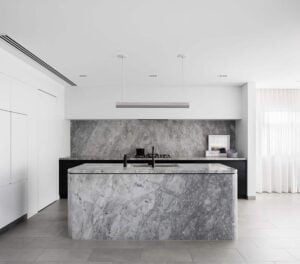There’s nothing quite like the visual impact of a stunning natural stone benchtop in your home and kitchen. For many avid fans of stone, one of the few drawbacks is the uncertainty around how to maintain your stone benchtops.
After all, a stone benchtop is a significant investment and while it’s highly durable and long lasting when properly maintained, it’s important that you treat your stone right and it will pay you back in spades.
Here are our expert tips for cleaning, maintaining and protecting your stone benchtops.
Simple Cleaning Methods
The best way to clean a stone benchtop is to keep it simple, always. The first rule is to ensure you use both clean and warm water when giving the benchtop a wipe. Secondly, always use a cloth that is soft and won’t scratch.
Thirdly, when you’re cleaning up a spill (and yes, they will happen) make sure you blot before wiping and work in small overlapping sweeps. Lastly, make sure you let the bench air dry and don’t risk scratching the surface manually drying.
Get Into The Habit Of Everyday Cleaning
In addition to cleaning the right way, you need to clean at the right time.
The best way to maintain a stone benchtop is by getting into the habit of conducting a simple, quick and easy clean every day.
Not only will it ensure your stone is always sparkling clean, it will also give you peace of mind that any small spills or bits of food that you may not have noticed will be picked up during the daily clean and won’t leave permanent marks or stains.
Quick Hands Prevent Staining
So, what do you do if something does spill over your beautiful stone benchtop? Simple: Act quickly!
The quicker you’re able to clean up a spill, the less likely it will be that a stain will be left. The first step is to blot the spill to soak up as much liquid as possible, before immediately rinsing a soft cloth (as you do with your daily clean) and apply warm, soapy water to the spot.
There’s no need to panic, but the faster you’re able to clean the better.
Be Careful of Your Soaps
Using the right soaps is an integral part of maintaining your benchtop.
Natural stone should not be exposed to abrasive or harsh chemicals. Whether you’re cleaning marble benchtops or tabletops made from granite, always use a neutral soap with a mild level of PH. Do NOT use any of the following:
- Acidic chemicals
- Harsh detergents
- Cleans that are oil based
- Turpentine
- Methylated spirits
- Bleaches
- Boiling water
Say No To Rough Scrubbing
While we’re on the topic of things not to do: Do not scrub your stone benchtop with a rough pad or cloth that might damage or scratch the benchtop itself.
No scouring pads, no steel wool, no abrasive cloths. Always be soft and gentle when wiping down your bench.
Prevention Is Better Than Treatment
The best way to treat stains and damage to your stone is by avoiding it all in the first place!
From pasta sauce and wine to food colouring and beetroot, there’s a lot that can (when left unattended) spill and stain.
Simply by using placemats, coasters and heat pads you can take small steps to preventing big mistakes.
Know What Stains
Properly sealed stone benchtops are hardy and highly durable, but it’s still important that you take care when working and cooking with certain foods that are prone to staining.
To give you a bit of an idea, here are some of the different foods to be careful with:
- Wine
- Beetroot
- Pasta sauce
- Turmeric
- Curry
- Berries
- Juices
- Oil
- Coffee
- Soy sauce
Take The Heat Off
It’s not just stains that you’ll want to keep an eye out for and off your benchtop. If you place hot pots or pans directly onto your stone, you risk leaving a burn mark, discolouring the stone itself or even risking a bit of a crack.
Always use a hot plate, insulated mat or trivet to protect your benchtop from damage from your heat. Never place hot items directly onto your precious and beautiful benchtop.
When Things Get Hard, Turn to Plastic
Even the most eagle-eyed individuals miss a little splash or spill every now and then. If you come later and notice that the stain has hardened, take care not to cause even more damage trying to scratch it off.
The ideal method of getting rid of hardened bits of food is to use a plastic utensil (be it a spoon, spatula or knife) and very gently remove the stain without scraping at the underlying bench.
Avoid Cutting On Your The Benchtop
This might seem like an obvious one, but for the sake of your gorgeous stone benchtop it bears emphasis here. Do not cut directly onto the stone. If you’re chopping up vegetables, always use a chopping board.
The last thing you want is to either leave marks or scratch away at the siny polish.
Another thing to remember is that you don’t use benchtops that can easily scratch or dent the stone either.
Avoid the Weak Spots
Stone is very hard wearing, but when you use it for your benchop the chances are that there will be areas of increased vulnerability. Particularly where the stone hangs over the end of underlying foundations, you should be careful not to place too much weight or downward pressure on those sections.
Never sit or stand on the benchtop, especially near the corners or ends.
Always Use Professional Repairers and Sealers
Marble, granite, limestone… Natural stone of all types could do with yearly or bi-yearly resealing to keep its somewhat porous material protected from the liquid it’s bound to be exposed to in your kitchen.
Make sure to always use professional sealers so you can rest assured the job is being done properly.
The same comes for repairs. Cracks, chips and scratches can be repaired in many cases but don’t risk causing more damage by doing it yourself. Make sure to get a team of experts in instead.
For More Tips, Get In Touch
We’ve barely scratched the surface–pun intended–of ways in which you can maintain your stone benchtop. For more tips and tricks, make sure to get in touch with our team here at Euro Marble.





